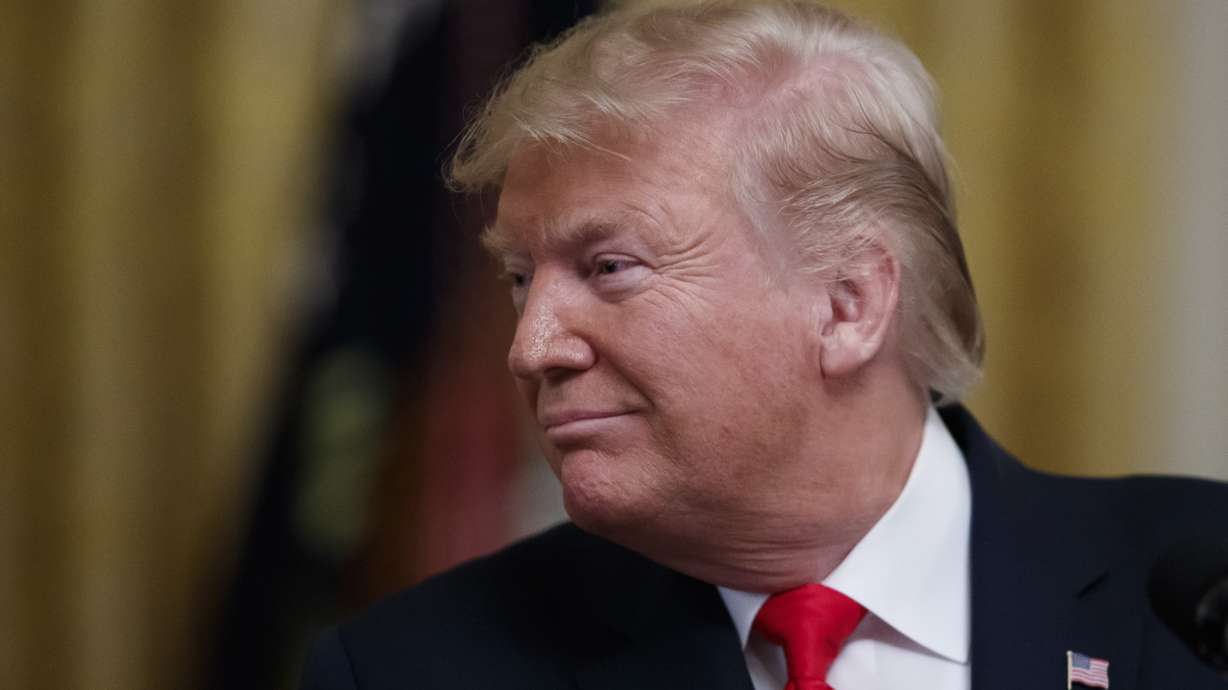Estimated read time: 4-5 minutes
This archived news story is available only for your personal, non-commercial use. Information in the story may be outdated or superseded by additional information. Reading or replaying the story in its archived form does not constitute a republication of the story.
WASHINGTON (AP) — President Donald Trump's campaign raised concerns to the nonpartisan presidential debate commission about fairness and the selection of moderators for the 2020 general election cycle, the campaign and the Commission on Presidential Debates confirmed Friday.
Trump campaign manager Brad Parscale and senior adviser Michael Glassner last month met with Frank Fahrenkopf, the co-founder and co-chairman of the Commission on Presidential Debates, to echo the president's complaints about the upcoming debates.
"I look very much forward to debating whoever the lucky person is who stumbles across the finish line in the little watched Do Nothing Democrat Debates," Trump tweeted last month.
"The problem," Trump claimed, “is that the so-called Commission on Presidential Debates is stacked with Trump Haters & Never Trumpers. 3 years ago they were forced to publicly apologize for modulating my microphone in the first debate against Crooked Hillary. As President, the debates are up to me, and there are many options, including doing them directly & avoiding the nasty politics of this very biased Commission.”
In actuality, the commission acknowledged after the September 2016 debate at Hofstra University in New York that “there were issues regarding Donald Trump’s audio that affected the sound level in the debate hall,” but it did not apologize.
The Trump campaign indicated to the commission in the Dec. 19 meeting that it planned to have the president participate in the debates but wanted reassurances about the fairness of the process and floated the idea of skipping them.
The campaign has held internal discussions about going around the Commission on Presidential Debates this cycle in organizing debates with other organizations, officials said. But it acknowledged the logistical and legal hurdles that would have to be surmounted for that to happen and expressed the preference of working through the commission's process.
The commission has already selected venues and dates for the cycle, cross-referencing religious holidays, the sports calendar and venue availability to select nights for three debates between the presidential nominees and one for the vice presidential nominees. The moderators won’t be selected until August, but the Trump campaign is seeking to influence their selection in advance.
“We want to have debates that are fair and are more geared toward informing the American people than to boosting the careers of the moderators,” said Tim Murtaugh, the Trump campaign's communications director.
Trump's advisers have seen no downside in pushing the commission, believing that there is an opportunity to work the refs for a friendly moderator now, before the Democrats select a nominee.
Trump’s distrust of the commission began even before the first general election debate in 2016, when he worried that the nonpartisan organization made up of longtime political insiders would be out to get him. He believed those fears were confirmed when he experienced audio issues in the debate hall in his first contest with Democrat Hillary Clinton. The television feed was unaffected.
The Trump campaign and the commission clashed ahead of the second debate, when the Trump campaign, in a surprise move, sought to use tickets reserved for family to seat women who accused Clinton's husband, former President Bill Clinton, of sexual misconduct in the front of the debate hall. The campaign ultimately relented, having the women sit elsewhere in the hall.
Trump also repeatedly complained about Megyn Kelly, the-then Fox News host who was one of the moderators for the first Republican primary debate in 2015, believing her questions to him in the non-Commission on Presidential Debates event were unfair.
In the meeting, Fahrenkopf walked the Trump officials through the neutrality requirements for commission board members. The campaign's meeting with the commission was first reported by The New York Times and The Washington Post.
It’s not unusual for campaigns to begin discussions with the Commission on Presidential Debates well before the quadrennial nominating conventions, as they seek to negotiate specific rules and influence the selection of moderators. To the commission, the Trump campaign effort is just a continuation of that tradition.
___
Lemire reported from New York.
___
Follow Miller on Twitter at http://twitter.com/@zekejmiller and Lemire at http://twitter.com/@JonLemire
___
Catch up on the 2020 election campaign with AP experts on our weekly politics podcast, “Ground Game.”
Copyright © The Associated Press. All rights reserved. This material may not be published, broadcast, rewritten or redistributed.









